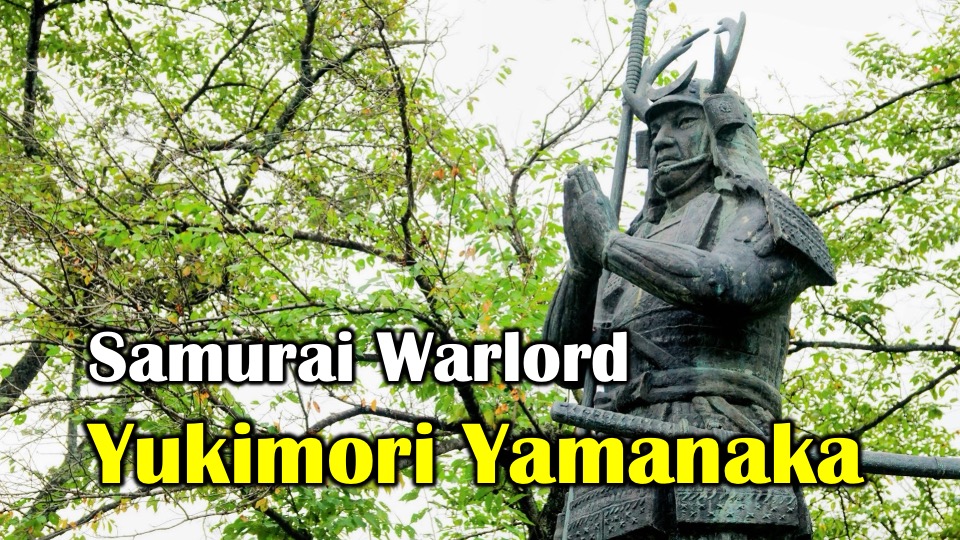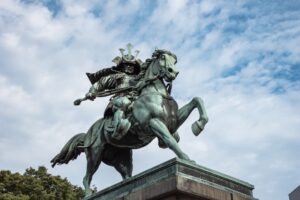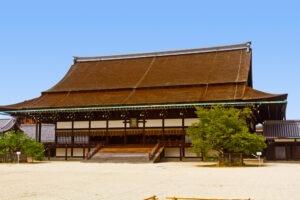In an age that often glorifies success and comfort, the story of Yukimori Yamanaka offers a powerful counterpoint.
He was a samurai who did not seek ease or fame, but instead prayed for hardship―so he could remain loyal to his fallen lord and carry the weight of a nation’s future on his shoulders.
This is not just a tale of battle, but a window into the timeless spirit of Japanese Bushidō: to live not for oneself, but for something far greater.

1 Introduction
What kind of person prays not for success, but for suffering?
In the tumultuous era of Japan’s warring states, one young samurai stood beneath the crescent moon and made a prayer that echoed across centuries:
“Grant me seven hardships and eight trials.”
His name was Yukimori Yamanaka―a warrior of fierce loyalty, unshakable purpose, and deep humility.
His life was marked by relentless struggle, betrayal, and ultimate sacrifice. Yet, through every trial, he remained true to his vow, not for himself, but for the future of his people and his lord.
This is not only a story of one samurai’s courage.
It is the embodiment of a spirit―one that refuses to seek glory, and instead chooses to endure, to persevere, and to live for something greater than the self.
In this tale, we find not only the soul of a warrior, but the quiet strength of Japan’s timeless values.
2 The Life of Yukimori Yamanaka
A Life Forged by Loyalty and the Crescent Moon
Yukimori Yamanaka, later known as “Shikanosuke,” was born in 1545, during the turbulent Sengoku era in Japan. From a young age, he showed exceptional bravery―reportedly taking an enemy’s head in battle at just ten years old. His family served the Amago clan, a once-powerful samurai family whose influence was fading under pressure from the rising Mōri clan.
One day, Yukimori’s elder brother presented him with a treasured family helmet adorned with deer antlers and a crescent moon crest. That night, under the moonlit sky, Yukimori looked up at the crescent moon and whispered a vow that would define his entire life:
“Grant me seven hardships and eight trials.”
It was not a prayer for comfort or glory, but one for hardship―a vow to remain loyal to a lord who, even in ruin, continued to serve his people.
Restoring the Amago clan became the guiding conviction of Yukimori’s life.
As the Mōri forces laid siege to Amago’s stronghold of Tomita Castle, Yukimori distinguished himself in battle after battle. His red-laced armor and crescent moon crest became symbols of fearless defiance. Even the enemy took notice. In one legendary encounter, Yukimori faced off in a dramatic one-on-one duel against a mighty Mōri warrior, defeating him in hand-to-hand combat while surrounded by cheering allies and enemies alike.
But the war dragged on for years. Food ran out. Allies fell in battle. Eventually, the Amago leader was forced to surrender, and the clan collapsed.Still devoted to his cause, Yukimori disguised himself and journeyed to Kyoto, gathering the remaining loyalists to plan a revival.
He found hope in a young monk―a descendant of the Amago family―who shed his robes and took the name Katsuhisa Amago. Together, they raised a new army and reclaimed much of their former territory. Yet just as victory seemed near, the Mōri struck back with overwhelming force. The Amago army was shattered once more.
Years passed. Yukimori turned to the powerful warlord Oda Nobunaga, who recognized his courage and gave him a final chance to reclaim his clan’s honor. Together with Toyotomi Hideyoshi, they launched a campaign against the Mōri. Yukimori led the charge, capturing Kōzuki Castle with 2,500 men.
But soon, 70,000 Mōri troops surrounded the castle. Isolated and without reinforcements, Katsuhisa committed ritual suicide. Yukimori, refusing to die yet, vowed to strike one final blow and allowed himself to be captured.
While being transported, he was betrayed and ambushed at the banks of the Kōbe River. Even then, he fought fiercely in the water before finally being overpowered and slain.
He was only 34.
Yet his legacy―of courage, devotion, and selfless loyalty―continues to echo across generations.
3 The Spirit Behind the Struggle
A Prayer for Hardship, A Legacy of Integrity
Why would a young warrior ask the heavens for suffering?
Yukimori Yamanaka’s prayer—“Grant me seven hardships and eight trials”—was not born of despair, but of purpose. It was a declaration of loyalty, a readiness to carry burdens so that others might stand tall. It was the mark of a man who believed that his life was not his own, but a vessel for a greater duty.
In Japanese culture, there is a belief that one’s true strength is not tested in times of ease, but in the face of adversity. For Yukimori, hardship was not an obstacle to avoid—it was the crucible in which virtue was forged. His courage did not stem from a lack of fear, but from a heart that trembled and yet still chose to advance. As he once judged two young warriors after their first battle, it was the one who admitted his fear who had the makings of a true samurai.
In this, we glimpse the deeper ethic of Bushidō—not the pursuit of glory, but the quiet endurance of duty. To persevere in the face of overwhelming odds. To stand firm even when no one is watching. To live and die for something larger than oneself.
Yukimori’s life reminds us that prosperity gained through shallow victories is fleeting. True greatness lies in the struggles that shape our spirit and the sacrifices we make for others. Though he died at thirty-four, his unwavering faith in loyalty and honor became a light passed down through generations.
In a world increasingly driven by instant success and personal gain, Yukimori’s story invites us to remember a different path:
To live sincerely.
To endure hardship with grace.
To believe that even a short life, lived with conviction, can echo far into the future.
4 Conclusion
Beyond the Self: A Japanese Spirit That Lives for the Future
Mencius, the great Chinese philosopher, once wrote:
“When Heaven is about to place a great responsibility on a person,
it first frustrates his spirit and will,
exhausts his muscles and bones,
exposes him to hunger and poverty,
and disturbs all his plans.”
This, Mencius believed, was how Heaven prepared someone to fulfill a great mission.
But while powerful, this idea still centers on the individual—one’s growth, one’s destiny, one’s greatness.
In contrast, Yukimori Yamanaka’s life reflects a distinctly Japanese spirit.
He did not seek trials for personal transformation. He prayed for hardship so he could serve something larger—his lord, his people, and the generations yet to come. Even as the Amago clan fell, he remained steadfast, not for personal glory, but to safeguard a flame that might one day be reignited.
His prayer was not “make me great,” but “let me endure”—so that others might prosper.
This idea, that one’s life is not solely one’s own, is central to the Japanese ethic. It is a belief that personal suffering, if embraced with sincerity and purpose, can become the foundation of collective stability and future hope. To live not for the self, but for the whole—for community, for descendants, and for unseen tomorrows.
Yukimori died at 34, but the legacy of his struggle lived on.
The Amago bloodline survived through vassals like Kamei Koremune, and Yukimori’s own son, who later founded the Kōnoike financial house—a legacy that shaped parts of modern Japan. His hardships did not vanish with him. They became bridges to prosperity for others.
In a world that often celebrates “winning,” his story reminds us of a deeper truth:
It is not only victory that matters, but what we live for, and how sincerely we live it.
This is the essential truth of life—and the greatest question that the spirit of Japanese Bushidō poses to us.
The Japanese way teaches us this:
Even when faced with seven hardships and eight trials, we do not curse fate—we carry it with dignity.
Not for ourselves, but for the life that follows us.
And in doing so, we plant seeds of hope that bloom beyond our time.


